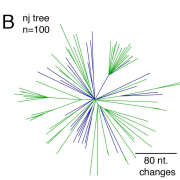Accumulation of mutations in A. thaliana over 400 years
The rate and potential relevance of new mutations in a colonizing plant lineage
We used a unique natural “experiment” to measure long-time substitution rates
Exposito-Alonso et al.
PLoS Genetics, https://doi.org/10.1371/journal.pgen.1007155
A consequence of an increasingly interconnected world is the spread of species outside their native range—a phenomenon with potentially dramatic impacts on ecosystem services. Using population genomics, we can robustly infer dynamics of colonization and successful population establishment. We have compared hundred genomes of a single Arabidopsis thaliana lineage in North America, including genomes of contemporary individuals as well as 19th century herbarium specimens. These differ by an average of about 200 mutations, and calculation of the nuclear evolutionary rate enabled the dating of the initial colonization event to about 400 years ago. We also found mutations associated with differences in traits among modern individuals, suggesting a role of new mutations in recent adaptive evolution.




